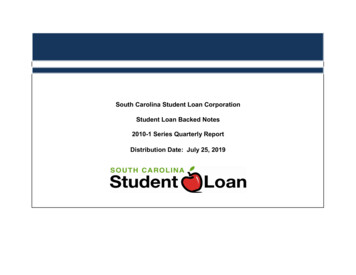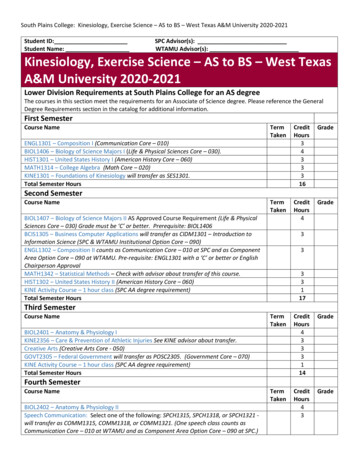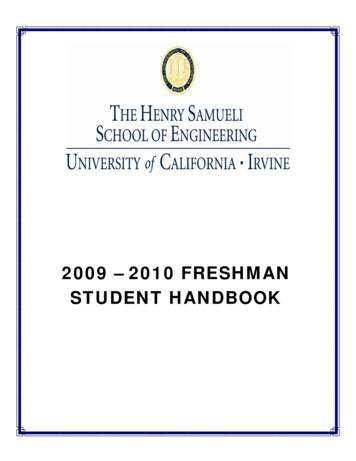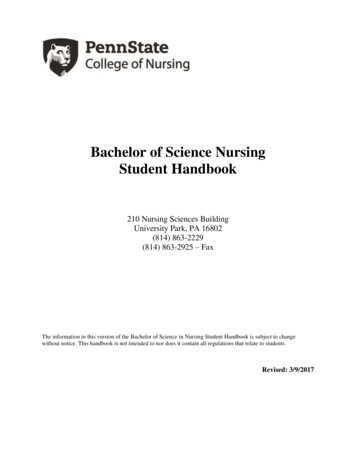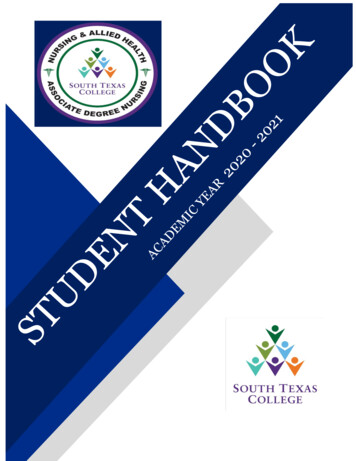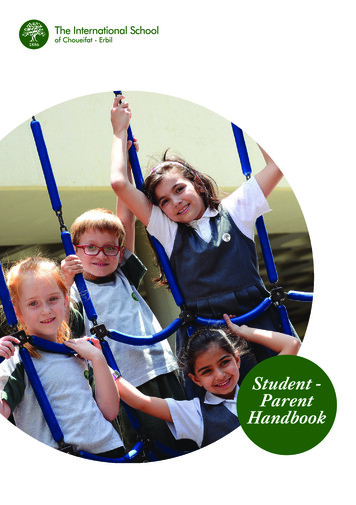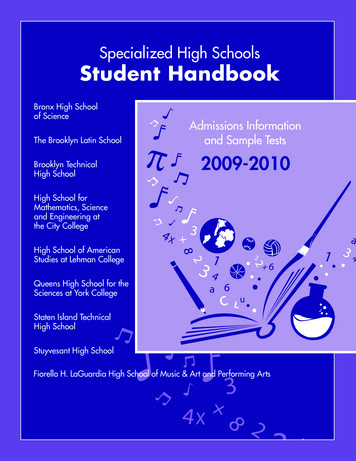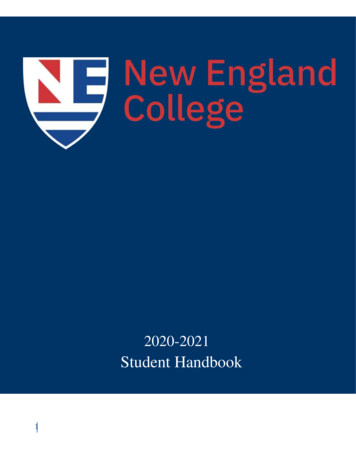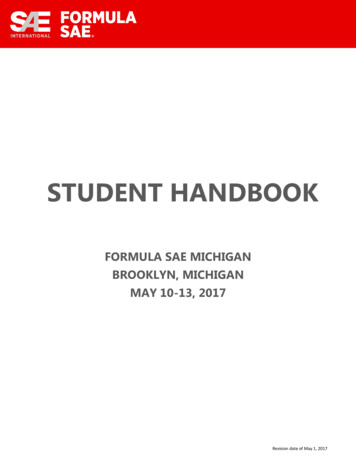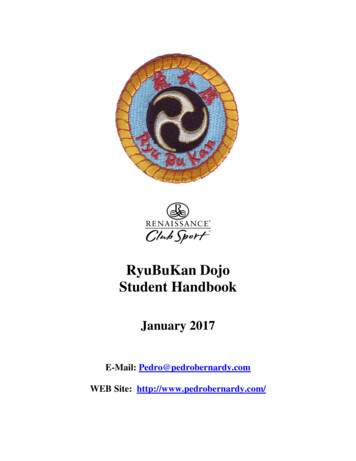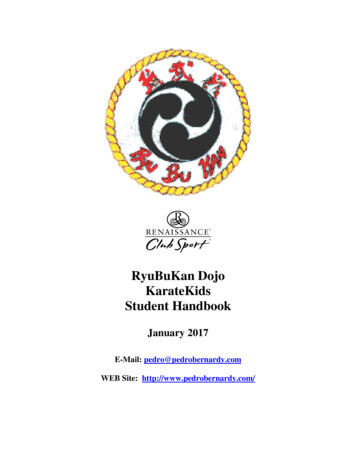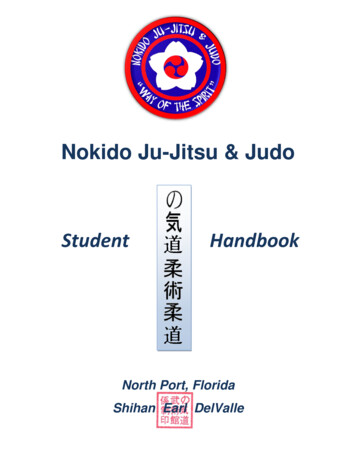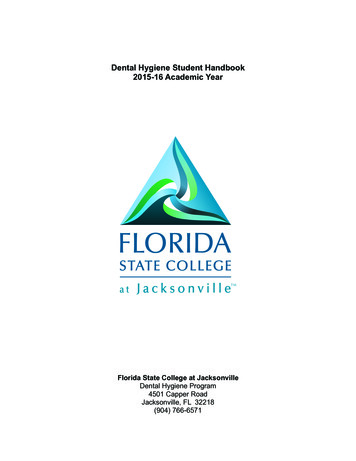
Transcription
Dental Hygiene Student Handbook2015-16 Academic YearFlorida State College at JacksonvilleDental Hygiene Program4501 Capper RoadJacksonville, FL 32218(904) 766-6571
Table of ContentsTopicWelcomeIntroductionFlorida State College at Jacksonville Mission and VisionDental Hygiene Program Mission and GoalsThe Dental Hygiene ProfessionProgram CompetenciesProgram DemandsTransfer StudentsServices for Students with DisabilitiesDental Hygiene CurriculumAcademic Guidelines – Grading PoliciesDismissal PolicyReinstatement PolicyCourse Withdrawal PolicyProgram Withdrawal PolicyDental Hygiene Program Termination FormDental Hygiene Program Dismissal and ReinstatementRulesDental Hygiene Program Returning Student ContractInfectious Disease PolicyImmunization PolicyCPR PolicyIncident InsuranceHealth InsuranceStandard of ConductAttendanceElectronic Device PolicyStudent Email PolicyExpected Professional StandardsExpected Professional Standards Sign-OffSubstance Abuse PolicyPolicy on Cheating, Plagiarism, and DishonestyProcedures for General and Academic 22232324242526272829
Classroom Attire and Personal Hygiene for StudentsPolicy on Clinical Dress Code and Professional BehaviorProgram Office ProtocolRecord of Conviction of a CrimeCriminal Background CheckA.D.A. Commission on Dental AccreditationConfidentiality StatementDental Hygiene Student Handbook Sign-Off3334353536363839WelcomeThe Dental Hygiene Program faculty and staff welcome you to Florida State College atJacksonville (FSCJ). If you are a returning sophomore student, we congratulate you oncompleting your first year of the dental hygiene program. This handbook has beendesigned specifically for dental hygiene students to provide some important informationabout the Dental Hygiene Program. We hope that you find the content informative andhelpful. This handbook is intended to supplement the FSCJ College Catalogue and theHandbook for Students, which contains material related to student rights, academicpolicies, registration, financial aid, campus facilities, and course offerings. We urge youto take time to familiarize yourself with all these documents.Instructional Program ManagerJeffrey R. Smith, DMDOffice Phone: (904) 766-6655E-mail Address: Dr.Jeff.Smith@fscj.eduFull-time FacultyJacquelyne Mack, RDHCynthia Wampler, RDHMonica Franklin, RDHProfessorProfessorAssociate Professor766-6575 jlmack@fscj.edu766-6744 cwampler@ fscj.edu766-6766 mofrankl@ fscj.eduStaffDiane HickmanCynthia RodgersStaffStaff766-6571 dhickman@ fscj.edu766-6572 crodgers@ fscj.eduAlthough your studies will be rigorous and demanding at times, please know that the faculty andstaff are here to support and mentor you, answer your questions, and facilitate the achievementof your goal to become a Registered Dental Hygienist (RDH). The material contained in thishandbook will provide answers to many of your questions about the Dental Hygiene Program;however, you should also communicate with your course instructors on a regular basis aboutyour progress in the program and any concerns that might develop. We encourage you to seekour assistance. The Dental Hygiene Program faculty and staff are committed to supporting youraccomplishments as you prepare to become a licensed dental hygienist. We wish you well asyou pursue your education here at Florida State College at Jacksonville.3
IntroductionWelcome to Dentistry. The Dental Hygiene Program provides the student with thespecialized knowledge and skills required for a career in dental hygiene. The curriculumincludes courses in general education, dental sciences and clinical skills. The graduatewill be able to practice as a dental hygienist in Florida upon successful completion of theNational Dental Hygiene Board Examination and the Florida State licensureexaminations (now administered by NERB)*. The Dental Hygiene Program at FSCJ isaccredited by the Commission on Dental Accreditation.The program offers students one degree option; the Associate in Science (A.S.) degree.The A.S. degree prepares the graduate for employment or transfer to select statecolleges or universities.Standards for appearance and behavior during the educational process must bemaintained. Violation of any of the following guidelines and regulations will be handledat the discretion of the supervising faculty and/or Instructional Program Manager (IPM).Violation could result in dismissal from a classroom or clinical experience with asubsequent loss of credit, or dismissal from the program in the event of critical or repeatinfractions. Please remember that these guidelines and regulations are not arbitrary andhave a function in your academic and clinical experiences. Your cooperation andcompliance with these policies are considered essential to the completion of yourprogram of study. Students unable to comply with these guidelines and regulations willbe dismissed from the program, as they will be unable to succeed in a professionalemployment setting. If you have any questions regarding these regulations, pleaseconsult any faculty member or the IPM.* Students seeking credentials to practice outside the state of Florida may have to complete additionaleducational preparation to be eligible for licensing.4
Florida State College Mission & GoalsMission StatementFlorida State College at Jacksonville provides high value,relevant life-long education that enhances the intellectual,social, cultural and economic development of our diversecommunity.Vision StatementFlorida State College at Jacksonville . Growing minds today, leading tomorrow’sworld.5
Dental Hygiene Program Mission & GoalsMission StatementThe mission of the Associate of Science (AS) Degree Dental Hygiene Program is tocreate competent, ethical, confident entry-level dental hygienists who are prepared toimmediately seek employment in dental offices in Northeast Florida and beyond. Thecurriculum meets the requirements of the Commission on Dental Accreditation. This isaccomplished with a combination of classroom and laboratory instruction at the Collegeand clinical instruction in the College's Dental Hygiene Clinic and affiliated dental clinicsin the community. A primary goal of the program is to instill in our graduates acommitment to professional development through life-long learning and service to thecommunity. Students who successfully complete the Dental Hygiene Program will beprepared to take both the National Board Dental Hygiene Examination and the statelicensing examination.GoalsTo provide the student with current theoretical and scientific knowledge forsuccessful completion of the dental hygiene curriculum, National Dental Hygiene Boardand state licensing examinations.To provide comprehensive preparation of competent individuals in the laboratory, preclinical and clinical experiences that are necessary to develop skill in renderingevidence-based professional dental hygiene patient care to the public.To provide the student with a thorough understanding of the cause of dental diseasesand the appropriate strategies for educating the community in primary and secondaryprevention of oral diseases.To enable the student to develop appropriate behaviors and interpersonal skills whichwill foster a respect for the Professional Code of Ethics and Conduct, and assurerecognition and acceptance of the responsibilities of the profession of dental hygiene.To provide students with the knowledge to conduct critical reviews of current literatureas a means of research and life long learning.The Dental Hygiene ProfessionDental hygienists are licensed preventive oral health professionals who provideeducational, clinical and therapeutic services. They support total health through thepromotion of optimal dental health. A dental hygienist clinician works with the licenseddentist and other dental auxiliaries as a member of an oral health care team. A dentalhygienist must obtain a license by completing both a written and a clinical examinationbefore practicing.6
Program CompetenciesProfessionalism1. The new graduate of FSCJ’s Dental Hygiene Program must be able to discernand manage ethical issues of dental hygiene practice in a rapidly changingenvironment.Specifically, the new graduate must be able to:1.1demonstrate honesty and integrity in relationships with patients,colleagues and other professionals.1.2comply with all state and federal laws governing the practice of dentalhygiene.1.3recognize patient record as legal document and maintain its accuracy andconfidentiality.1.4identify and report signs of abuse and neglect as required by law.1.5take action against the incompetent and unethical colleague.2. The new graduate of FSCJ’s Dental Hygiene Program must be able tocontribute to improving the knowledge, skills and values of the profession.Specifically, the new graduate must be able to:2.1advance the profession of dental hygiene through service activities andaffiliations with professional organizations2.2utilize, expand, and contribute to knowledge base of dental hygiene.2.3promote the values of the dental hygiene profession to the public andother organizations both within and outside of the dental profession.2.4apply self-assessment skills as preparation for lifelong learning &professional growth.2.5present themselves professionally in their actions, attitudes, dress, writtenand verbal communications.3. The new graduate of FSCJ’s Dental Hygiene Program must be able to acquireand synthesize information in a critical and scientific manner.Specifically, the new graduate must be able to:7
3.1access, analyze, and share professional data using written material, theinternet and computer technology.3.2use sound judgment in processing information, professional decisionmaking and application of new information to assure evidence-basedpatient care.Health Promotion/ Disease Prevention4. The new graduate of FSCJ’s Dental Hygiene Program must be able to provideplanned educational services using appropriate interpersonal communicationskills and educational strategies to promote the optimal health of the individual.Specifically, the new graduate must be able to:4.1identify the oral health needs of individuals and assist them in thedevelopment and maintenance of appropriate and individualized self-careregimes.4.2provide health education counseling using current and effective methodsof instruction and motivation.4.3promote preventive health behaviors by personally striving to maintainoptimal oral and general health.5. The new graduate of FSCJ’s Dental Hygiene Program must be able to initiateand assume responsibility for health promotive and disease preventativeactivities for the community.Specifically, the new graduate must be able to:5.1participate in the assessment, planning, implementation and evaluationphases of community-based oral health programs5.2identify populations in need of oral health services in a variety of settings.5.3identify services that promote oral health and prevent oral diseasesPatient Care6. Assessment: The new graduate of FSCJ’s Dental Hygiene Program must beable to systematically collect, analyze and accurately record baseline data on thegeneral, oral and psychosocial health status of patients using methodsconsistent with medico-legal principles.8
Specifically, the new graduate must be able to:6.1obtain, review and update a comprehensive medical, dental, nutritional,health behavior history including assessment of vital signs6.2recognize conditions that require special precautions prior to or duringdental hygiene treatment.6.3perform extraoral, intraoral, periodontal, and dental examinations andaccurately record findings.6.4obtain radiographs of diagnostic quality.6.5distinguish normal from abnormal radiographic findings and correlatethose findings with clinical exam data7. Planning: The new graduate of FSCJ’s Dental Hygiene Program must be ableto use critical decision making skills to identify existing problems, potentialproblems, etiologic factors, contributing factors, as well as establish realisticgoals and treatment strategies to facilitate optimal oral health.Specifically, the new graduate must be able to7.1analyze patient data to identify significant findings impacting the deliveryof dental hygiene services.7.2identify need for referral to appropriate health care professionals.7.3establish a planned sequence of educational and clinical dental hygieneservices based on patient’s identified needs.7.4establish oral health goals with the patient or guardian as an activeparticipant.7.5identify patient at risk for medical emergency, take steps to prevent anemergency and be prepared to manage an emergency should it occurduring the appointment.7.6obtain informed consent from patient or guardian prior to implementingservices.8. Implementation: The new graduate of FSCJ’s Dental Hygiene Program mustprovide treatment that includes preventive and therapeutic services designed toachieve and maintain oral health and assist the patient in achieving oral healthgoals.9
Specifically, the new graduate must be able to:8.1apply principles of dental hygiene instrumentation to remove depositswithout trauma to hard or soft tissue.8.2control pain and anxiety during treatment through use of legally acceptedclinical techniques and appropriate behavioral management strategies.8.3select and administer appropriate chemotherapeutic agents within thescope of dental hygiene practice in the state of Florida.8.4provide all needed dental hygiene services that may be performed legallyin the state of Florida.8.5provide pre- and post-treatment instructions when appropriate.8.6use measures to minimize occupational hazards in the work place.9. Evaluation: The new graduate of FSCJ’s Dental Hygiene Program must beable to evaluate the effectiveness of planned clinical and educational servicesand modify services as necessary for optimal oral health.Specifically, the new graduate must be able to:9.1determine the clinical outcomes of dental hygiene clinical and educationalinterventions using indices, instruments and examination methods.9.2determine patient’s satisfaction with the dental hygiene care received andthe oral health status achieved.9.3develop and maintain a continuing care system appropriate to patientneeds.9.4recommend referral for additional patient treatment as needed.10
Program DemandsIt is suggested that, due to the heavy demand on the student’s time required by thedental hygiene course work, students refrain from outside employment while enrolled inthe program. If you must work, a maximum work commitment of 12 hours per weekshould be maintained. Having a job is not an acceptable excuse for leaving class earlyor being absent.Transfer StudentsStudents transferring from another dental hygiene program must meet the samestandards as other students accepted into the program. The Florida State CollegeEnrollment Services office will evaluate non-dental courses to determine which creditswill be accepted. Dental Hygiene courses (DEA, DES, and DEH) will be evaluated bythe Instructional Program Manager and those completed more than two years prior toenrollment may not be accepted for transfer credit and may need to be repeated.Transfer students may be required to take a competency review course, and sit forchallenge examinations, as determined by individual course directors.Services for Students with DisabilitiesEducational support services are provided through the Auxiliary Aids Program within theOffice of Services for Students With Disabilities.As appropriate, the following services can be provided upon receipt of documentation ofa student’s disability. Notetaker Adaptive Equipment/Software Tutor Enlarged or Brailled Instruction Material Reader CLAST Waivers or Special Accommodations Scribe Course Substitutions Interpreter Voter Registration TestingAccommodationsAny student with a disability requesting assistance may contact the North CampusOffice of Services for Students With Disabilities at 904.766.678411
Dental Hygiene CurriculumCourse SequencePrerequisitesBSC 2085CCHM 1032CMCB 2010CMAC 1105MGF 1106Credit HoursHuman Anatomy & Physiology I4Principles of General Chemistry4Microbiology4College Algebra OR3Topics in College Mathematics15Dental Hygiene CurriculumFirst YearDES 1000DES 1000LDES 1030DES 1010DES 1600DES 1600LDEH 1001CDEH 1003CDEH 1720ENC 1101Term IOral and Dental Anatomy LectureOral and Dental Anatomy LabOral Histology and EmbryologyHead and Neck AnatomyDental Office Emergencies LectureDental Office Emergencies LabIntroduction to Clinical ProceduresInstrumentationPreventive DentistryEnglish Composition IDEH 1800DEH 1800LDES 1200DES 1200LDEH 2400BSC 2086CTerm IIClinical Dental Hygiene I LectureClinical Dental Hygiene I LabDental Radiology LectureDental Radiology LabGeneral and Oral PathologyHuman Anatomy & Physiology IIDEH 1802DEH 1802LDEH 2602DEH 2530DEH 2530LDES 1100DES 1101LINP 139011111143231823313416Term IIIClinical Dental Hygiene II Lecture1Clinical Dental Hygiene II Lab4Periodontics3Dental Hygienists Expanded Duties Lect 1Dental Hygienists Expanded Duties Lab 1Dental Materials Lecture1Dental Materials Lab1Human Relations31512
Second YearDEH 2804DEH 2804LDEH 2701DEH 2300DEH 2821Term IVClinical Dental Hygiene III LectureClinical Dental Hygiene III LabCommunity Oral HealthPharmacology and Oral MedicineMedically Compromised PatientDEH 2930DEH 2806LDES 2710DEH 2701LDEH 2811HUManities*Term VClinical SeminarClinical Dental Hygiene IV LabGeneral and Oral NutritionCommunity Oral HealthEthics and JurisprudenceSee General Education RequirementsTotal Credit Hours*14331121421131288Please refer to the College Catalog for acceptable Humanities courses.A minimum grade of “C” is required in all dental hygiene as well as in all generaleducation and natural science courses.General education courses appear in italics. It is strongly recommended that theybe successfully completed prior to starting the formal program.13
Academic Guidelines – Grading PoliciesA minimum college cumulative grade point average of 2.0 is to be maintainedthroughout enrollment and is necessary to progress in the dental hygiene program.The following percent-to-letter grade conversion is applied in all courses in the DentalHygiene Program 93-100%85-92.5%77-84.5%70-76.5% 69.5% ABCDFA minimum grade of “C” (77%) or better must be earned in each dental hygiene coursefor progression and completion of program.Students must satisfy all course requirements by the end of a given term to receive apassing grade, whether they are required attendance in class, laboratory projects, orpatient-completion and/or other clinical activities. In rare situations, an “I” (Incomplete)grade may be given for incomplete work due to acceptable extenuating circumstances(as determined by the instructor and IPM). Any “I” grade will require a student contractdetailing the schedule for completion of course requirements and consequences ofnoncompliance and may impact a student’s ability to receive financial aid. A failinggrade (“D” or “F”) will be recorded for the course if all requirements are not met by thedeadline stated in the student contract, except in the case of acceptable extenuatingcircumstances (as determined by the instructor and IPM).Clinical requirements for dental hygiene students will include completion of a specifiednumbers of patients and clinical procedures per term. Failure to complete the requirednumber of patients and specified clinical procedures in the prescribed timeframe mayresult in a failing grade.Decisions on student progression will be made by the responsible faculty person and allof the previous and following stipulations will apply: If the student feels she or he is having difficulty in any class, clinic, or lab, discussionwith the instructor or faculty advisor is strongly encouraged. Seeking help is nothing tobe embarrassed about and may be the difference between passing and failing a course. “I” grades are on
The Dental Hygiene Program faculty and staff welcome you to Florida State College at Jacksonville (FSCJ). If you are a returning sophomore student, we congratulate you on completing your first year of the dental hygiene program. This handbook has been designed specifically for dental
